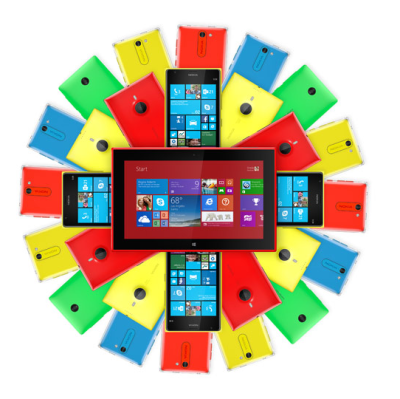
Microsoft CEO Satya Nadella and VP of Microsoft Devices Group Stephen Elop
On Friday, Microsoft completed the acquisition of Nokia Devices and Services business. This acquisition brings several key components from Nokia into Microsoft: “Microsoft acquires Nokia’s smartphone and mobile phone businesses, its design team, most of its manufacturing and assembly facilities and operations, and sales and marketing support.”1 The deal, originally announced in September of 2013, represents a major shift for Microsoft. Somewhat similar to the short-lived Google Motorola acquisition, this deal puts Microsoft in charge of the leading Windows Phone manufacturer. Stephen Elop, former Nokia CEO now VP of Microsoft Devices Group, noted “The opportunity for Microsoft to be both a devices and services company, so that it can deliver the complete proposition to its consumers, is at the heart of this.”2
According to just about every comment coming from inside Microsoft, this deal will both drastically improve manufacturing efficiency and the Windows Phone platform as a whole. Tom Gibbons, the Microsoft corporate vice president who is responsible for the Nokia integration, noted as much in a comment on the acquisition:
The real value from this integration is bringing two globally sized capabilities in organizations together under one roof, really intimately and much more efficiently…Customers should see a bunch of great end-to-end experiences that really empower them to have very enjoyable, very comprehensive solutions to things that they want to get done, whether you’re talking about smartphones or feature phones. The feature phone product family coming to Microsoft will start to have more of the Microsoft services shipped on those phones right out of the gate.3
So this is clearly a great move for Microsoft, but what is to become of Nokia?
Nokia retains 3 major business units: Nokia Solutions and Networks (NSN), HERE – mapping and location services business, and Advanced Technologies – the R&D wing of the company. Though Nokia has yet to make any major announcements in regards to the future and direction of the company – except that there will be an announcement when it reports Q1 2014 earning on April 29, 2014 – it seems that the company will focus on it NSN business. According to CNBC, Nokia’s network infrastructure wing will become the main business component of the company:
The deal closes another chapter in the long-running story for Nokia as it begins to focus on its network infrastructure business and technology after ditching its unprofitable handset business.4
In addition, Nokia also retains a large number of patents. It is uncertain if the company will look to unload these patents in the near future.
- Suzanne Choney, Microsoft News Center, “Microsoft, Nokia Devices and Services business aim to remake mobile market,” 25 April 2014 ▲
- Ibid ▲
- Ibid ▲
- Arjun Kharpal, CNBC, “Nokia seals Microsoft deal amid new CEO speculation,” 25 April 2014 ▲

